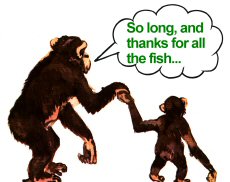Feature Articles
13 April 2008

Renewables Provide A Ray Of Sunshine In Energy Debate
It's becoming increasingly common for policy makers to tout "clean" nuclear energy as the only viable alternative to fossil fuels. But this is ignoring the fact that important inroads are being made with renewable energy sources such as solar power. The question is: are alternative energies emerging fast enough to be considered a viable alternative to nuclear energy?
2 April 2008
Under Pressure: Earth Science (Part II)
This week we continue with a top ten list of urgent Earth science questions devised by a group of leading Earth science experts at the behest of the National Research Council...
17 March 2008
Under Pressure: Earth Science (Part I)
In order to better understand our volatile planet, a bunch of US scientific agencies recently encouraged leading Earth science boffins to bang their heads together to identify the 10 most pressing Earth science questions...
2 March 2008
Citizen Scientists And The Web Of Life
A new online resource will allow scientists and "citizen scientists" to collaborate on an unprecedented project called the Encyclopedia of Life, which will eventually contain detailed entries for every living creature on Earth...
17 February 2008
Hormones Gone Wild
Hormones are essential for the regulation of tissue function, growth and development, metabolism and mood. Disruption to our hormonal system can have serious consequences, which is why scientists are becoming increasingly worried about the chemicals known as "endocrine disruptors" that are found in personal hygiene and cosmetic products...
2 February 2008
The Rhythm (And Melody?) Of Life
Listening to music of any kind is an integral aspect of our lives, but is it a necessary aspect? There may be lots of folks who live without music, but scientific research shows there is much more to music than there is to other so-called leisure activities that we consider enjoyable...
20 January 2008
Ten Intriguing Questions
Do candles burn in zero gravity? Was a manhole cover really the first man-made object in space? Why do men still have nipples? Bone up on ten niggling science questions that your kids are bound to ask at some point...
7 January 2008
How Do We Cure An Industrial Hangover?
As we proceed turkey and pudding-stuffed into yet another year, and we've finally nursed our sore heads back to health, there's another consumption-based ailment to consider: our industrial hangover...
18 December 2007

Homo Superior
Genetic engineering is getting serious. Recently researchers have shown that "hardwired" responses - such as fear - can be manipulated and even reversed, that extreme muscle growth is possible, and that sexual preference can be changed. But if we create a race of superhumans, would this lead to a golden age of peace, love, and understanding; or would it be business as usual?
30 November 2007
Skin Deep
While the bad old days of an overt "whites only" policy could be dismissed as consciously constructed segregation, more recent types of racism seem to be "unconscious," below-the-surface manifestations. But do these cases of unconscious racism suggest that racism is a product of evolution?
19 November 2007
Sexing Up UFOs
You could argue that the concept of Earth-visiting aliens is to science what Intelligent Design is to creationism. That is, both world-views exploit such unlikely and improbable speculations to forward scientific research and theological teaching - though obviously in very different ways. Why, for instance, do you rarely hear scientists come out and explain how unlikely it is that intelligent civilizations are visiting Earth?
2 November 2007
In Design We Trust
Automated machines are driving us all crazy for the very same reasons the Terminator was considered the perfect killing machine. They can't be bargained with, and they can't be reasoned with. They don't feel pity or remorse or fear and they absolutely will not stop, ever, until you fall into a pathetic sobbing heap on the floor...
19 October 2007
Context And Computer Vision
A bunch of computer scientists believe they can create computers capable of seeing the world with a human perspective using a simple, but lesser-known, publicly available widget from Google...
5 October 2007
The Space Race's Softer Side
This month Vienna will play host to the first ever "comprehensive trans-disciplinary dialogue on humans in outer space" - or so the blurb goes. The rationale behind the conference is to see what a meeting of minds between scientists and representatives from the humanities can produce (obligatory slippers, tweed jackets and pipes on all shuttle flights, perhaps)...
21 September 2007
Moore's Law No More?
Intel Corporation's co-founder Gordon Moore recently conceded that his law predicting the number of transistors on a computer chip to double every two years will soon no longer hold. But what will the demise of Moore's exponential transistor paradigm mean for computing in the future? Is this the end of the golden age of computing?
7 September 2007
Guess Who's Coming To Dinner?
Our hairy primate relatives have highly developed intelligence and social skills, as evidenced by their tool usage and hierarchical social order. But what about social intelligence? Could an opposable-thumb challenged chimp pass muster at a human social gathering?
24 August 2007
Leaving The Body Behind
The latest bit of paranormal hokum getting a reality check is the mystical out-of-body experience, or OBE. A collaborative team of scientists and philosophers reports progress toward understanding what happens when someone experiences an OBE and they believe that solving the mystery of OBEs will ultimately reveal where we derive our sense of self...
10 August 2007
Microbial Awakenings
Australian boffins were cock-a-hoop this week over the fossilized 3.5 billion-year-old life forms that they found; despite detractors saying that the fossils may not be organic matter. As Bones, of Star Trek, was fond of saying; "It's life Jim, but not as we know it." Meanwhile, another research team is busy bringing ancient frozen microbes back to life...
27 July 2007
The Dino Dynasty Reconsidered
Our understanding of dinosaur lineage is flawed, says a new study that contends dinosaurs actually lived alongside their ancestors for tens-of-millions of years. And the possibilities for paleontological revision don't end there, as another study has cleared the way for yet more possibilities (as if we needed any more) as to how the dino dynasty ended so abruptly...
13 July 2007
Evolution And The Hive Mind
Would it be too far fetched to suggest that social pressures could affect brain function at a genetic level? One study has identified collective behavioral differences between the United States and China, possibly suggesting the beginning of brain divergence among humans...
29 June 2007
The Information Insurgency
For good or ill, both the Agricultural and Industrial Revolutions were immutable world-changing events, so it would seem that the Information Age has a lot to live up to. But unfortunately, things aren't looking good on that front. Dispatches from intellectuals and researchers in the trenches of the Knowledge Revolution are painting a grim picture of what lies ahead for humanity...
22 June 2007
Rethinking Black Holes
General relativity and quantum mechanics are uncomfortable bedfellows when it comes to explaining black hole formation and a number of researchers now contend that black holes may not actually fully form at all...
15 June 2007
Kinematics - The Language Of Invention
Machinery is so ubiquitous these days that it has almost become invisible to us - at least until it breaks down. But even less recognized is the theoretical system of machine design notation known as "kinematics" that paved the way for complex machines. Now, a new book looks at the interesting and important aspects of kinematics that have become lost or forgotten down through the ages...
8 June 2007
Down On The Farm? Yields, Nutrients And Soil Quality
While systemized, large-scale agriculture delivered last century's much ballyhooed agricultural revolution, history tells us that unsound farming methods can cause the collapse of civilizations. Now, it seems, Western nations may once again be staring down the barrel, as studies into today's commercial farming practices show that they are having a negative effect on crop yields, nutrient content and the environment...
1 June 2007
The Personal Face Of Evolution
Research suggesting that animals - from primates to mollusks - have personalities means that scientists are now asking intriguing questions regarding the evolutionary significance of personalities, and the advantages and disadvantages that different types of personality can confer...
25 May 2007
Turbocharged Evolution
Instead of waiting for nature's sluggish hit-and-miss process of producing a viable adaptation or mutation, researchers have shown that it may be possible to engineer evolutionary processes in a fraction of the time. Specifically, recent research on synthetic proteins indicates that there may be no limits or time constraints on human evolution - should we so choose...
11 May 2007
POP Goes The Planet
While most would agree that there's nothing wrong with making global warming a popular issue, there is a risk that other clear and present environmental dangers are being eclipsed. One largely forgotten issue is the insidious problem of persistent organic pollutants (POPs) that continue to wreak havoc on the Earth's ecosystems...
27 April 2007
Take Me To Your Lame Duck President
With the recent discovery of the Earth-like planet orbiting Gliese 581, comes renewed speculation about the possibility of making contact with an extraterrestrial intelligence. Somewhat tellingly, immediately after the Gliese 581 discovery, puny Earthling bookmakers lowered the odds of us stumbling upon aliens from 1,000/1 to 100/1...
20 April 2007
Electronic Maladies
PCs, plasma screens, cell phones, laptops, wireless gadgets - we can't seem to get enough of them. And why not? They've reduced our workloads and dramatically increased our social networking capabilities. But could all this modern technology be adversely affecting our health?
13 April 2007
Eye Of The Beholder Redux
New research is not only raising some poignant questions about the nature of art appreciation, but also highlighting how both science and art have the capacity to expose the natural world beyond everyday perception...
5 April 2007

Eeew!
The emotion of disgust may once have been important in preventing food poisoning and breeding snafus, but expert opinion ranges widely in regard to how useful it is in today's society, with some scientists claiming that disgust is just an irrational evolutionary throwback...
30 March 2007
Metagenomics: The More The Merrier
Metagenomics, a new holistic technique to analyze vast swathes of microbial DNA, may make it possible to view ecosystems themselves as biological units with their own genetic repertoires, and to sidestep completely the consideration of individual species...
23 March 2007
Have You Hugged Your Robot Today?
Earlier this month, Korea announced that it was drafting a set of ethical guidelines for robot producers, users - and the robots themselves. "How quaint," I thought, until further research revealed that assorted futurists and AI experts are at this very moment diligently working toward establishing equal rights for robots...
16 March 2007
Publish AND Perish
The prestige that a small number of scientific journals have attained over the years has made them into authorities that scientists continually refer to, but just what exactly underpins the scientific reputation that these publications have garnered?
9 March 2007
The Dummies Guide To Mind Reading
Researchers have recently been able to forecast a subject's intentions. If our minds turn out to be this deterministic at much more complex levels, then the thought police could soon be on their way...
2 March 2007
The Slacker's Guide To Serendipitous Research
Scientists may not like to admit it, but serendipity has played a big role in many modern wonder drugs and gee-whiz inventions. So, if you're a young researcher looking to become a zillionaire, what's the best way of getting serendipity working for you? As a helpful guide, we've listed five choice tips which should put you on the road to riches...
23 February 2007
5 Minutes To Doomsday
The Bulletin of the Atomic Scientists recently reset their Doomsday Clock forward 2 minutes, just to show everyone that once again we are all on the brink of catastrophe (as if we'd have it any other way). But what exactly does the Doomsday Clock achieve, and why should we take any notice of the time-setting habits of a bunch of boffins anyway?
16 February 2007
Is Evolutionary Development Like Flat-Pack Furniture?
Could horizontal gene transfer that occurred in the distant past account for the incredible development of the human brain, and the subsequent human-chimp split? If so, what piece of vital genetic information did we acquire that gave us our cognitive edge?
9 February 2007

Going Gaga Over Gaia
As scientists continue to grapple with the complexities of climate change, one thing is becoming abundantly clear: each of Earth's seemingly discrete environmental systems is crucially dependent upon another. This basic yet important observation has led scientists to reconsider the Gaia Hypothesis - a controversial idea first proposed in 1970...
2 February 2007
Survival Of The Cutest
The protection of endangered species is central to many conservation agencies, yet invariably it's the same pleasing-to-the-eye creatures that hog the limelight. Sumatran Tigers and baby Harp Seals push the right buttons with the public, but would promotional images of an endangered Antigua Ground Lizard or Wyoming Toad elicit the same response? Probably not, with new research predicting that only the most aesthetically pleasing creatures may survive humankind's continued reshaping of the Earth...
26 January 2007
The Universe As Magic Roundabout: Part II
If Lynds is right, then we live in a universe where there is no past or present, and one that is deterministic, even if it is impossible for us to recognize it as such. But there are a number of pressing questions in regard to Lynds' model. How does it fit in with current research that claims that the universe will expand forever? Does Lynds' model imply that the universe somehow "knows" to play events over and over? And will we all have to relive our lives backward?
19 January 2007

The Universe As Magic Roundabout
The model of the universe that Lynds is proposing, similar to others before him, is that the universe is in fact closed and subject to an infinite cycle of big bangs and big crunches. However, the difference between Lynds' theory and those that have gone before it is that in Lynds' model the big bang is no more the beginning of the universe than the big crunch is its end. That while the universe is finite, there is no arrow of time; there is no past or present, and that in neither a big crunch nor big bang is a singularity ever reached...
12 January 2007
String Theory? Knot!
Ever since string theory was first proposed in 1969 it has been plagued by controversy. Now, its chief proponent has come out and conceded that his initial model is likely only one small part of a much more complex multifaceted megaverse. But recent discoveries in astrophysics may tie a Gordian knot in string theory...
5 January 2007
Periodic Puzzling
The periodic table, which has symbolized chemistry ever since its controversial conception during the 1860s, is largely thought of as a fixed reference work, but the table is yet to be completed, and some lucky scientists' careers involve running high-energy tests to fill in the gaps and perhaps catch a glimpse of the table's ultimate limits...
22 December 2006
A Strange Matter Indeed
Strangelet advocates argue that quarks, rather than nuclei, are the ground state of matter; which has profound implications for the death of very heavy stars, where they would resolve not into neutron stars, but instead into much denser "strange stars"...
15 December 2006
Monkeying Around With Human Health
We're told that animal trials are crucial for the development of new drugs and medical treatments, but a recent study asks fundamental questions about the effectiveness and usefulness of animal research in regard to human health...
8 December 2006

Planet Earth: Love It And Leave It
Environmentalists take issue with the elephantine budgets routinely sunk into space exploration, which they believe could be better spent fixing Earth's more immediate problems. But a new book contends that both environmentalists and space agencies are really working toward the same end: the survival of the species...
1 December 2006
Fear And Loathing At The Patent Office
Thanks to school textbooks, patents, popular wisdom and historical apathy; there is usually only a sole inventor ever attributed to any one invention. But the reality of the situation is that true "Eureka!" moments are the stuff of legend, and that new inventions are cumulative accomplishments involving many individuals from varying disciplines. So, at the risk of making a whole slew of trivia board games obsolete, let's take a look at five historical figures and their tenuous grip on the inventions credited to them...
17 November 2006
RealityCity
Putting an entire metropolis together so it runs like clockwork is a complex job. How do you prevent ghettos from developing? Do you put your public transport system at street level or below? Now, a new supercomputer application lets urban planners play god and steal a sneak peek into the success or failure of future cities before they are built. SimCity, make way for RealityCity...
10 November 2006
The Ten Scariest Medical Mishaps
Doctors and medical specialists are miracle workers, right? And when we go to hospital, we'll leave healthier than when we arrived, right? Well, not always, as accidents do happen and modern medicine isn't exempt from Murphy's Law. So, what are the most terrifyingly medical blunders that could happen to you?
3 November 2006

Bow To Your Insect Overlords!
Exponential growth of insect numbers is well and truly on the cards if global warming continues unabated. They won't be huge in size, but there will be an awful lot of them. And some scientists think that's only the beginning of our problems, suggesting that we're looking at the wrong sources for the next epidemic or pandemic. While we all wring our hands over media reports of avian flu, insects really are a much bigger threat...
27 October 2006
Is Dawkins Delusional?
If science is open to scrutiny, then why should religion be exempt if it too is laying claim to the ultimate truths of our existence? "Why shouldn't we comment on God, as scientists?" asks Richard Dawkins, in his new book, The God Delusion. But critics from all quarters have been less than enthusiastic in their appraisals of Dawkins' anti-religious tirade...
13 October 2006

Too Cool For The 21st Century
Cryonics is what you might better know as a sci-fi plot device; think suspended animation or stasis. But rather than journeying to a distant planet, cryonic aficionados will stay on Earth in the hope that they can be revived in the future and cured of whatever ails them in this life. Or even better, that future medical science might have found a way to give them immortality...
6 October 2006
Martian Dreaming
A manned mission to Mars sounds like a pretty irresistible proposition. And yes, we have the technology to get there. But forget all those sci-fi depictions of manned Mars missions, where aliens, asteroids or a faulty airlock pose the most serious problems. A real manned mission would involve something much more dangerous - radiation...
29 September 2006
Nanotech Gone Bad: Who You Gonna Call?
There's no doubt that the development of micro-machines the size of a molecule will affect humanity as fundamentally as the Industrial Revolution did. But like any other technology, there are going to be some downsides...
22 September 2006
Rewriting The Cosmic Rulebook
Many space buffs felt a queasy sense of dislocation when the non-planet formerly known as Pluto was unceremoniously hustled out the observatory back door by some shady looking professorial types. But our cherished cosmological models may be in for a much bigger shake-up with supernova SNLS-03D3bb...
15 September 2006
Did Civilization Emerge Thanks To A Change In The Weather?
Using evidence from archaeological digs and the palaeoclimatic record, one scientist claims that significant changes in social organization have coincided with abrupt climate change. But this isn't about yet another ancient civilization collapsing. Rather, it's about the changes societies undergo as adaptive responses to climate change. In fact, what we call civilization may be the by-product of these social adaptations to environmental change...
8 September 2006

MySpace And The Dumbing Down Of Friendship
Americans have fewer close, personal friends than they used to. This fact, coupled with the rise in popularity of social networking websites has many academics worried about how technology has distanced us from those closest to us. It seems that the authenticity of real-world relationships simply isn't important anymore, as we've elevated convenience, which technology provides, over substance...
1 September 2006
Church And State Mixed In The Test Tube
Embryonic stem cell research has hit the doldrums, stalled in the eye of a perfect storm of controversy. And taking advantage of the momentarily calm weather, politicians everywhere appear to be hoisting-up policies based around their own personal belief systems. Worryingly, it appears these decisions are being driven by an undercurrent of religious conservatism rather than reasoned ethical concerns...
18 August 2006
A Portrait Of The Artist As A Tin Man
What is creativity? What creates value in art? If creativity is derived from the ability to link together and express diverse inputs, then would robots capable of doing this be deemed to be creative? But if we can't comprehend and define our own creativity, how can we ever expect a robot to create something that we consider art?
11 August 2006
Noises Off At The Patent Law Medicine Show
Patent law amendments supposedly now provide for developing nations facing health emergencies by allowing them to legally manufacture and/or import cheaper generic drugs. But either due to bureaucratic red tape or the ever-present threat of a lawsuit, these provisions have proven difficult to access. Now, two health policy experts are crying foul...
4 August 2006
Black Holes: Have They Reached Their Use-By-Date?
Black holes have garnered so much publicity over the years that they seem almost to have assumed themselves into existence, but on closer inspection the evidence underpinning their existence is not at all impervious to scrutiny. In fact, current research into black holes is turning up some fairly quirky results, which may prove correct Einstein's original hunch that black holes couldn't possibly exist...
28 July 2006

Pulsars: What Are We Missing?
The idea that pulsars are an alien engineered form of galactic communication isn't greeted with much enthusiasm by the scientific mainstream. But more than 30 years after the first discovery of a pulsar, we still know very little about them. Explaining pulsar radiation is one of the most difficult problems of astrophysics and it seems the more we learn about pulsars, the more baffling they become...
21 July 2006
Universal DNA Switch Shakes Up Biology
The startling discovery that all forms of life on Earth use the very same mechanism to initiate a cell's division into twin daughter cells has caused somewhat of a commotion among biologists. It may not sound like much to the layman, but the discovery casts doubt on a number of long-standing and cherished biological models. But rather than it being a crisis in biology, it simply shows how science - in an era that some have dubbed the dawn of a "scientific dark age" - remains as vital and dynamic as ever...
14 July 2006
Letting The Brain Out Of The Box
Researchers have managed to hookup neural sensors to the brains of severely paralyzed people and have them control various external mechanical devices by thought alone. Could such technology catalyze a leap in human cognitive powers? Probably not, given what happened with other "breakthroughs" like television and the Internet. It seems that each successive technological breakthrough just delivers more titillation rather than catalyzing any significant leap in human cognition. Let's hope - probably in vain - that this time it's different...
7 July 2006
Where Do Rusty Rockets Go When They Die?
Tracking and monitoring all the bits and pieces of rubbish in Earth orbit is becoming more and more complex as we continue to send more stuff up there. But according to NASA, the amount of space-junk at some altitudes in low Earth orbit could soon become unstable (meaning get much worse, much more quickly). This possible instability is due to collisions becoming the dominant debris generation mechanism, with the debris generated feeding-back and inducing more collisions...
30 June 2006
Designed By Mother Nature
Developing a new technology from scratch is a complex and time consuming business, so wouldn't it be handy if scientists had a pre-existing blueprint at their disposal? As it happens, they do, and fortuitously it exists all around us: nature. And using nature as your template provides the added bonus of not having to worry about pesky patents. The science of copying nature, known as biomimetics, is not altogether new - think radar, Velcro and da Vinci's flying machines - but it is garnering increasing attention, with anything from the biomechanics of frog legs, to the sensing ability of rat's whiskers, being used as a basis for new inventions...
23 June 2006
Less Than Zero-Point Energy
"Matter seems to be solid, stable stuff that we, and the world, are made of. So maybe matter resists acceleration not because it possesses some innate thing called mass as Newton proposed, but because the zero-point field exerts a force whenever acceleration takes place." Welcome to the world of zero-point energy...
16 June 2006
Contrails And The Dark Side
In order to curb global warming it's likely we'll need to make a number of lifestyle sacrifices. Arguably, one of the most inconvenient of these would be air travel. Jets certainly pump out their fair share of greenhouse emissions, which would be reason enough to consider cutting back air travel, but jets add to global warming in yet another way. The long trails of condensation known as contrails emitted by jet airliners are now considered to be a significant factor in global warming. Furthermore, a group of UK meteorologists recently found that night flights make contrail troubles considerably worse...
9 June 2006
Yes, We Have No Bananas
The banana is the most exported fruit in the world, and the fourth most important crop behind rice, wheat and maize. Nearly all of the bananas bound for the world market, and your local supermarket shelves, are of the Cavendish variety, leaving the banana market in a precarious eggs-in-one-basket situation. There have been warnings of banana crop extinctions coming from various sources for a number of years now, but the most recent one from the United Nation's Food and Agriculture Organization says that unless extra care is taken in maintaining species diversity, the banana may soon disappear...
2 June 2006
Bloodsucking Medical Marvels
Contrary to Hollywood film depictions, you can find leeches in places other than the steamy tropical swamplands of the Amazon. In fact, you can find them anywhere from freezing polar waters to the otherwise unforgiving climate of the desert. And it turns out that the quacks of bygone days only had it half-right about the medicinal properties of leeches, as they were unaware that it's not the bloodletting that's important; but rather the chemicals that the leech releases into the surrounding tissue that apparently work medical wonders...
26 May 2006
Basic Instinct Not So Basic After All
Is there a fundamental difference between instinct and planned behavior? One would hope so, but recent research into tool use among apes has blurred the distinction somewhat. Indeed, it's possible that all organisms - including humans - are just running on automatic, according to a hierarchy of fixed-action-patterns triggered by key stimuli...
19 May 2006
Into The Shadows - Searching For Alien Life On Earth
People with obsessive-compulsive hand-washing syndrome should stop reading right now. As well as all the microbes we do know about, some scientists suggest there could also be alien microbes living on Earth as well. This as yet undetected alien population of microbes could exist quite happily next to our own, and as such has been referred to as the "shadow biosphere"...
12 May 2006
Botanic Mechanics Celebrate 150 Year Long Experiment
Apparently, watching grass grow isn't quite as boring as you may expect, and can, in fact, be downright fascinating. This is especially true if you happen to be one of the many ecologists eagerly anticipating the arrival of The Park Grass Experiment's 150th anniversary celebrations, which will be held at Rothamsted Research later this month. After a century and a half, The Park Grass Experiment is in fact the world's longest running ecological experiment...
5 May 2006

Bringing Up BabyBot
Researchers hope BabyBot, a new robot modeled on a human infant, will bring science closer to understanding consciousness. The methodology behind BabyBot is in stark contrast to many other AI initiatives that have expended a great deal of effort into cramming prefabricated "knowledge" and "facts" into machines in the hope that they will ultimately end up mimicking human intelligence. Results from this top-down approach range from patchy to downright disappointing, so it's no surprise that a growing number of AI researchers are now looking more seriously at BabyBot's bottom-up approach...
28 April 2006

Sexual Success And The Schizoid Factor
Ever wondered why scruffy rock chicks are pursued by legions of doting male fans? Or why women threw themselves at Pablo Picasso? Well, a new study suggests that creativity may confer an evolutionary advantage in finding a mate. But creativity often comes with traits predictive of schizophrenia - a condition not normally associated with evolutionary fitness. Is there enough evidence to support the idea that artistic creativity is an evolutionarily beneficial effect of schizoid tendencies?
21 April 2006
Bionics: The Six Million Dollar Question
You won't hear much about bionics outside medical conferences these days, but when The Six Million Dollar Man hit the airwaves during the 70s, it was a hot topic of conversation around the water cooler. Today, against a backdrop sketched by nanotech futurists such as Ray Kurzweil, bionics is set for a comeback, but this time, we're told, it'll be for real. The six million dollar question is: could someone equipped with today's bionics go mano a mano against Col. Steve Austin and come out on top?
13 April 2006
Can Computing Power Thwart Avian Flu?
Using a supercomputer, scientists at Los Alamos have made some predictions about how avian flu may spread in today's environment of worldwide connectivity. The team used a large-scale, stochastic simulation model to predict what possible path a human-to-human transmissible version of the H5N1 virus might take. The simulation, using city, census and Department of Transportation travel data, shows how the virus would spread among a population of 281 million people over a period of 180 days...
6 April 2006
We Come In Peace - NOT!
When Hollywood brings hostile extraterrestrials to the big screen, humanity always triumphs in the end. But these films represent nothing more than unwarranted Earthling optimism, say the authors of An Introduction to Planetary Defense, a deadly serious discussion on defense contingencies and strategies in the event of an alien invasion...
31 March 2006
From Little Things, Big Conundrums Grow
Nanotech's impact on humanity will be enormous, so the Center for Responsible Nanotechnology has formed a special task force comprised of experts from multiple disciplines charged with: "developing comprehensive recommendations for the safe and responsible use of nanotechnology". But is a collaborative network of big-brained individuals really enough to control the nanotech genie once it's out of the bottle?
24 March 2006
Ozone - The Pollutant That Got Away
Scientists at the NASA Goddard Institute for Space Studies have evaluated how ozone pollution in the troposphere has contributed to warming in specific regions of the world over the past 100 years. They found that ozone in the lower levels of the atmosphere was responsible for a staggering one-third to one-half of observed warming in the Arctic region...
17 March 2006
Tunguska Event Responsible For Warming Climate?
It's enough to give you a migraine, trying to reconcile all the possible factors that might contribute to climate change. But what if they're all inconsequential, and there's only a single event causing the warming trend? The 1908 Tunguska meteor's explosion over Siberia is what one Russian scientist believes could be behind current global temperature rises...
10 March 2006
What's Normal About Renormalization?
For a number of physicists, there is an increasing sense of unease about the current state of physics. Much of this disquiet is to do with the way modern physics relies on some sneaky techniques to explain away the trickiest bits of the accepted model. Without these corrective bolted-on components, much of modern physics simply doesn't stand up to scrutiny...
3 March 2006
It's Life Jim, But How Do We Know It?
While SETI continues to scan the sky for that elusive broadcast from an extraterrestrial Howard Stern, some scientists believe we should be going back to basics to reassess what we might class as extraterrestrial life. One of the pressing questions coming from this new paradigm strikes at the very heart of biology. Should we modify our definitions of "life" and biology's traditional tree of life model to accommodate the inhabitants of these alien worlds?
24 February 2006

Food For Thought
Was it a shoreline diet rich in iodine that triggered explosive brain growth in early hominids? One scientist thinks so, although his detractors maintain that language and tool-use were the catalysts for our big brains...
17 February 2006
The Rain In Spain Falls Only In The Human Brain
New research suggests that humans have an innate and universal faculty to form sentences, supporting the idea that we are born with a ready-made language "module" in our brain. If grammar usage and symbol-to-object association are universal in humans, then some long standing controversies in cognitive research may finally be put to rest...
10 February 2006
Lunar Prospects Up In The Air
Both Russia and the US have been making noises about the potential benefits - like mining - of establishing lunar bases. But a new theory concerning the moon's odd shape may derail plans for the easy exploitation of the moon's resources...
3 February 2006
Normalizing The Paranormal
"Imagination is more important than knowledge," said Einstein. But just how far should this concept be taken? Does this mean that any idea can be imbued with an air of legitimacy just because it is being investigated scientifically? Specifically, can - and indeed should - paranormal and other unexplained phenomena be explored on a scientific basis?
27 January 2006

Earth-Like Planets Galore?
An international team of astrophysicists recently stumbled upon the most Earth-like planet yet discovered, and they believe there are likely thousands more to be found. Their discovery is a major step towards answering the big question of whether or not we are alone in the Universe...
20 January 2006
Birds Ain't Doing It, Bees Ain't Doing It, And Biodiversity Is The Victim
A global decrease in pollinators such as birds, bees and flies means that plants in biodiverse hotspots are not getting enough pollen to reproduce. While it's possible for plants to self-pollinate, this alone does not progress or strengthen the species, as, like any other living organism, a plant needs genetic variation in order for the species to survive. And it's this lack of genetic variation that could make widespread plant extinctions unavoidable...
13 January 2006
Science In 2006: Reading The Tea Leaves For The Year Ahead
Genuine "Eureka!" moments are few and far between in science, which makes the business of predicting scientific breakthroughs a dangerous pastime. The recent media frenzy surrounding South Korea's fallen stem cell hero Hwang Woo-Suk reminds us that science, while striving for the establishment of new knowledge, is also about the tearing down of falsities. But despite the grim prognosis for scientific navel gazing, we've managed to ferret out some interesting tidbits from a grab-bag of researchers...
